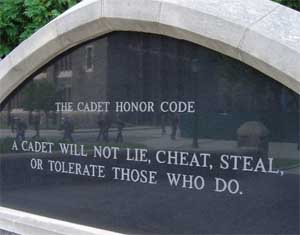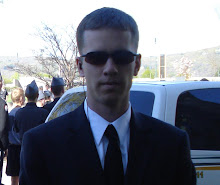This time I have some actual words of encouragement from a mentor...
It's my constant endeavor to convey just what goes through the head of a cadet as they prepare to graduate. Relationships is one such thing, especially as many people are preparing to get married in the weeks following graduation and preceding their officer basic schools. Don't worry, I'm not going to make that mistake.
My friend/hero/mentor John wrote to me the other day some relationship-related stuff and it's pretty amazing I think: "Get a load of this. Amazing. I was typing and then thought I should just send you a short commentary that I read the other day. The only problem is I threw it in the trash. So I went out to the community trash barrel (huge about 3 cubic yards in size) in our alley to get it. I was hoping that the trash pick-up hadn’t occurred yet, but it did. I looked in the bottom of the barrel and there was a single sheet of paper. I thought maybe, just maybe that might be it. I climbed in to take a look. When I turned it over I was shocked. It was the article I was looking for. I’m really surprised. So…. it must be meant for me to forward it on to you. See the attachment."
You know you've got a good friend/hero/mentor when they go dumpster diving on your behalf! Here's the article that he sent to me. I like what Mr. Keating has to say in the second half of his writeup, because I do wonder about what my vocation in life is going to be (i.e. married, single, or religious) and I do tend to think in terms of the princess charming idea. The last two words bother me a little bit, because who in life wants to be "sufficiently happy," but in the context of the rest of the sentence/article it does make sense.
The Non-Existent Prince Charming by Karl Keating
When I was very young, like many my age I thought that liking and loving were the same thing, with the latter being an intense variant of the former. It was only as I grew that I learned that liking and loving, while similar and often coincident, are different.
The chief difference is in the will. Whether you like someone is pretty much outside your control. The person’s appearance, attitude, or affections may or may not appeal to you.
Nowhere in the New Testament is our Lord recorded as having old us to “like one another.” Instead he instructed us to “love one another” (Jn 13:34, 35; Jn 15:12, 17). In these verses he put this not as a recommendation but as an outright command: “I have a new commandment for you” (Jn 13:34); “this is my commandment” (Jn 15:17).
Liking is something that “just happens.” Loving is something we have control over. Liking is a spontaneous emotional reaction. Loving is an act of the will. You never will like everyone, but you can love anyone. It I theoretically possible in a way that liking everyone is not.
And this brings me to the topic of prospective spouses.
Catholic Answers hosts chastity talks by various speakers. Such talks are aimed at young audiences- high school and college students, chiefly- and, by necessity, the speakers themselves are fairly young.
Some speakers who have spoken for us, when first starting out, told their young audiences that somewhere out there was a Prince or Princess Charming, someone fated from all eternity to be a young person’s perfect match. The speakers said something like this: “save yourself for that one person that God has set aside just for you.”
When I learned about that statement, I told our speakers to cut it out- because it wasn’t true. It sounded romantic, and it sounded pious, but it wasn’t true. It left each young listener thinking that there was one and only one person whom he could have a happy marriage with and that if he waited long enough, God would arrange for the couple to meet.
That’s not how real life works. When I have a chance to speak to young people, I shock them by saying, “within easy driving distance, there are a hundred happy people whom you could marry and have an equally happy life with.” Of course, there are also a hundred or a thousand with whom they might be miserable.
This does not, of course, mean that every match is a good one or that every match is wisely entered into. But it does mean that fairly tales should be left to children.
It does no harm for a 10-year-old girl to dream of a Prince Charming, but half her life will be wasted if she still thinks, at 35, that she should wait for the appearance of a Prince Charming whom God has reserved for her and that she should let pass other prospects with whom, in fact, she could be sufficiently happy.





